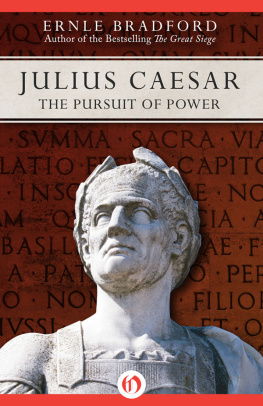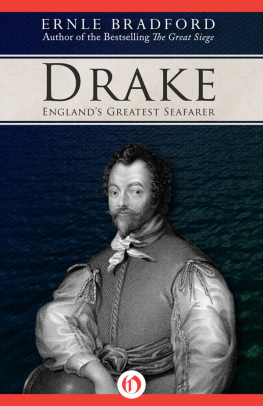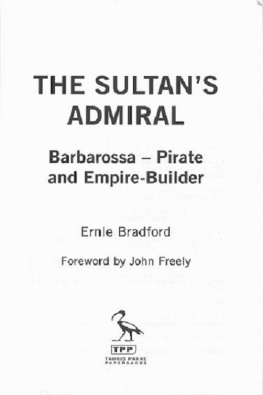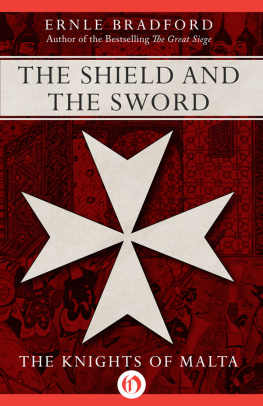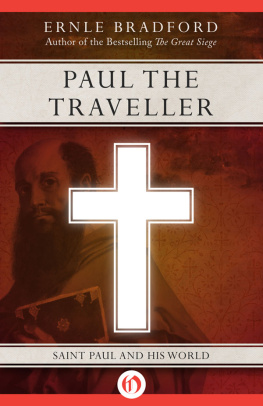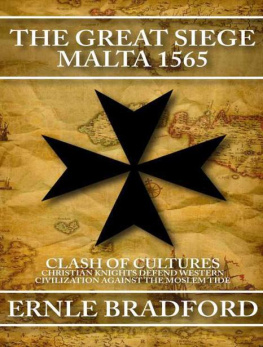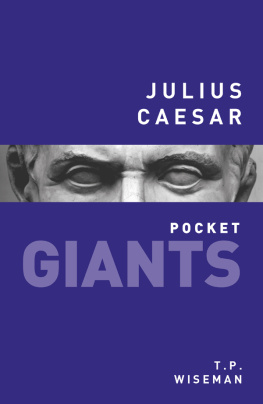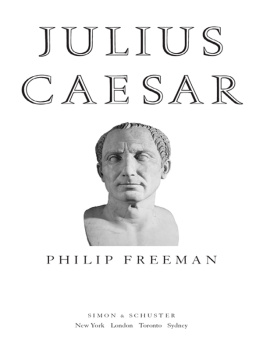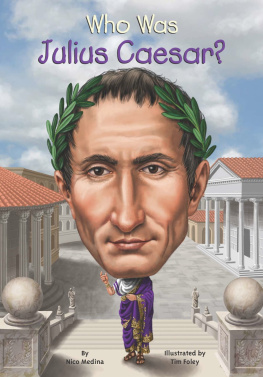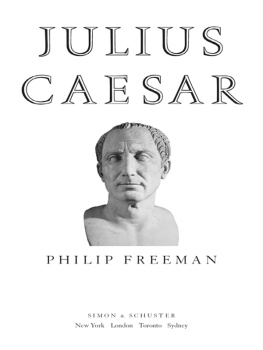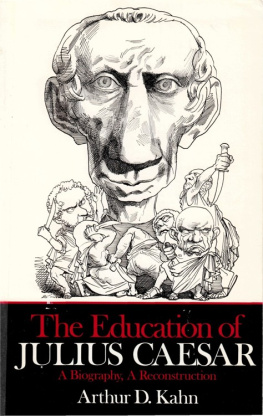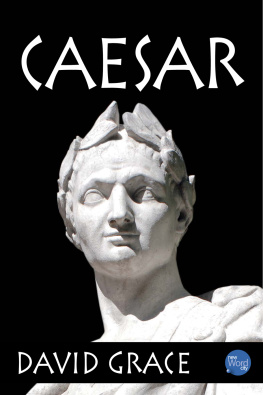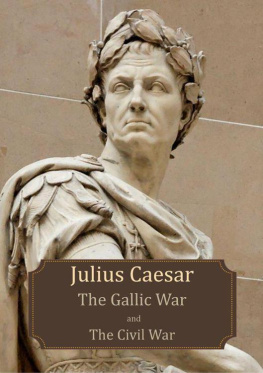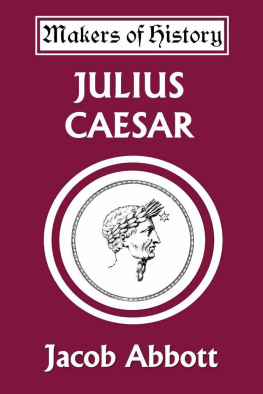Julius Caesar
The Pursuit Of Power
Ernle Bradford

To the memory of Zachary Macaulay Booth
Immortalia ne speres, monet annus et almum Quae rapit hora diem.
Acknowledgments
I should like first of all to express my particular thanks to Mr. A. R. Burn who has helped and advised me on this book, as on others before it, both during its preparation and on the subsequent revision of the completed manuscript. I am very indebted for his assistance on matters of fact, while on matters of emphasis or faults and omissions all errors remain mine.
I would also like to record my thanks, as so often over the years, to the London Library. I have used throughout for the translations from Plutarch the one usually known as Drydens version, since I find that its sonorous English seems to me better to reflect the original than a modern translation would do. I would like to thank Penguin Books Limited for extracts from Suetonius, Lives of the Caesars, trans. Robert Graves; and Juvenal, The Sixteen Satires, trans. Peter Green.
ERNLE BRADFORD
September, 1983
Let the dice fly high.
Luck is the greatest power in all things and especially in war.
If things do not always fall right, luck can be given a helping hand.
Cairn Julius Caesar
Ancestry and Antecedents
CAESAR was an aristocrat. He was an aristocrat by birth and by nature: two things that are far from synonymous. To be born into the so-called aristocracy of a country or an age means little in itself. Some, by their abilities and conduct, earn the right to be called aristocrats. But few over all the centuries are born to the purple, more than earn their title, and so distinguish themselves that they establish a new standard for the best. Caesar was one of these: although it must always be accepted that morality (in the sense of moral conduct) played no part in his distinction.
Caius Julius Caesar was born in July 100 BC. He was the only son of Caius Julius and Aurelia and, more important, nephew of the then consul Marius. The Julii were one of Romes original patrician families, but one that had left relatively little mark upon history. His mother, also of noble birth, seems to have been cast in the mold of the old type of Roman matron: women unaffected by the new fashions from Greece and the East which were so profoundly changing the manners and morals of Rome. It was an old-fashioned family, in fact. His father became a praetor (one of the chief officers of the senate) but never rose to the dignity of consul.
The family was neither rich nor poor, well-born but comparatively undistinguished, and conservative in the real sense of being moderate, cautious and averse to change.
The month in which Caesar was born was formerly called Quintilis but was subsequently renamed July in his honor. His personal name or praenomen was Caius. The first Caius in the clan had been born some seventy years before and had married a certain Marcia of the patrician family which claimed descent from the legendary kings of Rome. Caesar himself laid claim to an ancestry so ancient that it could not be disputed since there were no records except that on both sides his family had been noble since time immemorial. In one public speech he was to declare that his family were descended in direct line from Venus/Aphrodite. Since, according to Homer, the goddess was the mother of Aeneas, the Trojan hero, and since, according to later legend, Aeneas was the founder of the Roman race, Caesar was laying claim to an ancestry that could not be challenged. His admirers seem to have accepted this explanation of his lineage, al-though how much Caesar himself believed it must remain doubtful. Certainly a hallmark of his character was always a strange insouciance, as ifperhaps because of the supposedly divine origin of the Julian linehe felt that nothing could touch him unless decreed by the fates. The name Caesar is connected by tradition with an ancestor who is said to have killed an elephant of the Carthaginian army, the sobriquet deriving from the Punic word for an elephant.
As was customary at that time among the upper classes Caesar was taught Greek. His tutor was an educated Gaul, most probably from northern Italy, who was said to have been as well versed in Latin as in Greek literature and in later years to have established a school of rhetoric which was attended by Caesar during his praetorship in 66 BC. It might at first seem strange that an aristocratic family should employ a Gaul as a tutor, especially in Greek, when Italy swarmed with Greeks and almost every household of any importance could point to a Greek tutor, secretary or librarian, but it is perhaps an indication of the innate conservatism of the family: Greeks were reputed to be effeminate in their manners, often homosexual, and were considered degenerate by old-fashioned Romans. A Gaul on the other hand, and an educated Gaul, was a very different man to have about the house. In the early days when Rome had been gradually subjugating Italy they had proved the most troublesome, freedom-loving, and bravest of all the tribes whom the Romans had encountered. When Hannibal had swept over the Alps in 218 BC, the Gauls had risen with him and, throughout the fifteen years he had spent in Italy, had proved the backbone of the Carthaginians army. The Romans accordingly had a great respect for the Gauls: not only for their fighting qualities but, now that they had become settlers and farmers, for their diligence, endurance and faithfulness. It was true that in Gaul-across-the-Alps their related tribes still swarmed as wild, fearsome and untamedexcept in Romanized Narbonese Gaulas when they had harried Italy. But now among the rich and noble Romans the big-boned, fair-haired Gauls were a familiar sight and respected for their many qualities, not least for their attachment to the family they served much as once they had been attached to their own clan. In somewhat similar fashion, many centuries later, the rulers of Britains empire would find in Egypt their trustworthy servants among the Sudanese, and in India and the Far East the amah, or devoted native nurse to care for their children.
Of Caesars early years nothing is recorded except that he is said to have written a poem in praise of Hercules and a tragedy based on the story of Oedipus. Certainly he was to write poetry until late in his life (though almost nothing has survived), and of course the muscular, limpid prose which distinguishes his seven books of commentaries on the wars in Gaul remains an eternal monument. The subject of Hercules might have been invented for the future hero and cleanser of the Augean stables, but Oedipus seems a curious choice although a Freudian might make too much of the fact that, as a child, his relationship with his mother Aurelia had always been very affectionate and happy, and in later years he was passionately attached to her. His father, having been praetor and then propraetor in Asia, died at Pisa in 85 BC SO that Caesarwith two sisters but no brotherbecame the man of the family in his sixteenth year. His mother, throughout the storm of his life, remained a steadfast image of the Roman hearthside and of values that everywhere else were collapsing. If Caesars political, financial, and sexual morals were a far call from those of old Rome, at least in his conduct as a soldierin his toughness, endurance, and tenacityhe invariably displayed the same qualities which had given the Romans of an earlier century the final victory over Hannibal.
In 84 BC, at the age of sixteen, Caesar put on the toga of manhood. He was at this time in his life, Suetonius tells us, tall, fair and well-built, while Plutarch adds that he had a fine white skin but contradicts Suetonius by saying that he was slightly built. He had a rather broad face and keen, dark-brown eyes. Since both biographers lived long after Caesar was dead they were relying on busts and statues, hearsay and the memories of old men, themselves recounting tales told them as children. Suetonius, however, had access to the imperial and senatorial archives as well as to a large body of contemporary memoirs, while Plutarch cites lists of authorities for his

